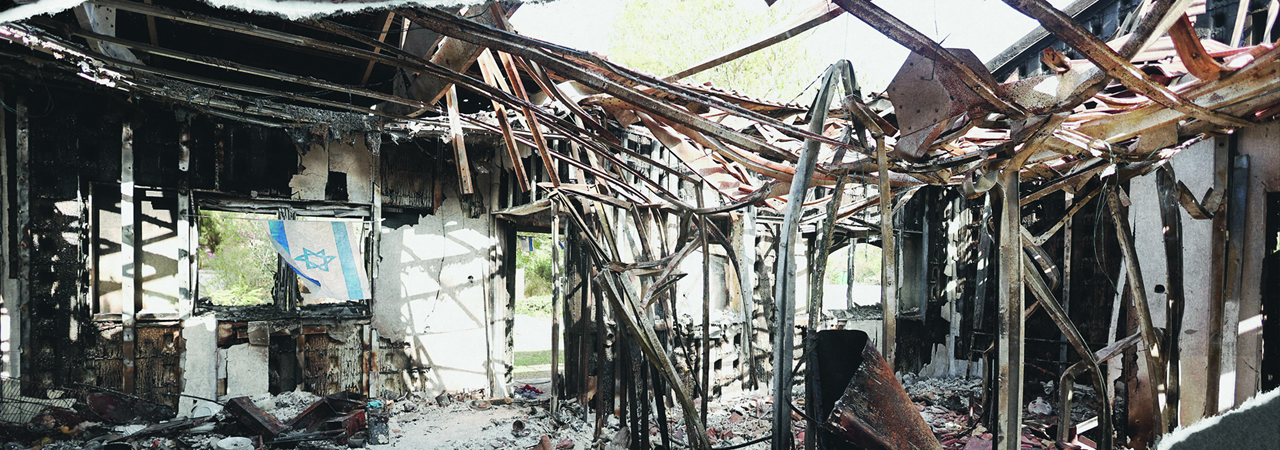Israel’s Disillusionment
The State of Israel changed on October 7, 2023. Hamas, which has ruled the Gaza Strip since 2005, launched a devastating war against the country. This event, which has already fundamentally changed the nation, will bring about even more changes. War doesn’t just change the parties involved, but also everyone who hears about it.
In 1948, Israel was born in a difficult war: the War of Independence. Against the odds, Israel won. At that time, the West wasn’t Israel’s biggest helper or friend; most of their help came in the form of weapons smuggled in from eastern Europe. For example, the first airplanes came from what was then Czechoslovakia, rather than from the United States, as is the case today.
In its early years, France was Israel’s military protector. Under Marcel Dessault’s influence, France supplied Israel with Mirage jets and other military equipment. The supply continued to increase after Operation Kadesh and the Sinai Campaign. But from the very start, even while receiving this assistance, Israel nonetheless experienced pressure from both the West and East, as well as from the United Nations.
Over the years, Israel experienced several other wars: the Six-Day War, the War of Attrition, the Yom Kippur War, and the Lebanon Wars of 1982 and 2006. At the same time, Israel was fighting the first and second intifadas. In addition to all these wars, the State of Israel managed to transform from an underdeveloped and antiquated country, into a highly developed and advanced one that is now at the forefront of technology. A deeper relationship with the United States, and a sort of love/hate relationship with Europe and the rest of the West, came into being.
All these things left their mark on the State of Israel, and the scars are still visible today. The problem with Judea and Samaria arose from the Six-Day War. Peace with Egypt was followed by the evacuation of the entire Sinai Peninsula. Israel learned from the 1982 Lebanon War, that the lives of its soldiers are more valuable than territorial gains. Israel began to invest more and more in defense. It developed the Arrow missile defense system, later David’s Sling, and eventually the Iron Dome system, when Hamas began to fire rockets from Gaza.
Israel has repeatedly been forced to use military intervention. This is especially true in the Gaza Strip, but also in Lebanon, Judea, and Samaria. As a result, Israel became somewhat addicted to a “false peace,” becoming lenient in many things. Israel ultimately delayed the search for a solution to the Israeli-Palestinian conflict that arose from the Six-Day War. Although many attempts were made, a solution was never reached, because neither side was truly willing to pay the price. Both sides must be willing to pay—that’s the cost of peace.
On the eve of the current war, there was relative calm on the borders with Lebanon and Syria, as well as in Judea and Samaria, due to their economic dependence on Israel. Thanks to the Iron Dome, the number of victims in the conflict with Gaza was reduced. But this seeming calm exposed a number of other problems in Israel. A simmering dispute in Israeli society reached a climax: the polarization between religious and secular, between left and right; demonstrations supporting and opposing legal reforms, and so much more. That situation caused Israel to forget its surroundings, like a drunk person driving a car despite all the dangers and threats.
People in Israel have been talking for years about the risk that Hamas will gain strength in Gaza, Judea, and Samaria, and of the danger that Iran will move closer to Israel’s borders with Syria and Lebanon. Many warned that Israel’s enemies would be happy to see the people divided, and there were also those who warned that the army was unprepared and lacking in equipment. But all these things were ignored, because Israel’s desire for peace outweighed them.
Israel’s disillusionment is painful and complex. Its price includes over 1,200 murdered and others kidnapped (not as prisoners of war) during the brutal attack by Hamas terrorists. Children were murdered in front of their parents, and unarmed, helpless people were slaughtered simply because they were Jews. The murderers proudly bragged about their actions to their families and to the people of Gaza, who in turn cheered and praised these terrible deeds. There was no public Palestinian voice expressing horror at these atrocities; instead, there was only agreement or tacit recognition. To this day, it is difficult to find those among the Palestinians in Gaza who would condemn Hamas, or even in Judea and Samaria.
 Israel awoke like a roaring lion surrounded by hyenas. It went to war to free the hostages and wipe Hamas from the face of the earth. With its actions, Hamas represented evil in the eyes of the Jewish people, an evil whose desire is to obliterate them. This same evil was represented by the Nazis in World War II, and was depicted in the Bible by Amalek and the wicked Haman. It attacks the weak and defenseless, but its goal is the destruction of the Jewish people.
Israel awoke like a roaring lion surrounded by hyenas. It went to war to free the hostages and wipe Hamas from the face of the earth. With its actions, Hamas represented evil in the eyes of the Jewish people, an evil whose desire is to obliterate them. This same evil was represented by the Nazis in World War II, and was depicted in the Bible by Amalek and the wicked Haman. It attacks the weak and defenseless, but its goal is the destruction of the Jewish people.
For now, Israel has set aside the differences between right and left to unite against a cruel enemy. The debate between religious and secular Jews disappeared when they were called up into reserve service together. Legal and constitutional reform stopped, and the demonstrations fell silent. All the funds that had been invested in internal disputes were used to strengthen the military. All sorts of organizations that had formed to support sides of various debates, now joined together to support the war effort.
 All the warning signs had gone unheeded over the years—because Israel was blind in its desire for peace—now suddenly became war fronts. The first and clearest is against Hamas in the south. The second is against the strengthening of terrorist organizations in Judea and Samaria. The third is directed against Hezbollah in the north. The fourth is against Iran and its proxies in Syria and Iraq. And lastly, against the Houthis from Yemen.
All the warning signs had gone unheeded over the years—because Israel was blind in its desire for peace—now suddenly became war fronts. The first and clearest is against Hamas in the south. The second is against the strengthening of terrorist organizations in Judea and Samaria. The third is directed against Hezbollah in the north. The fourth is against Iran and its proxies in Syria and Iraq. And lastly, against the Houthis from Yemen.
Another point of disillusionment is related to Israel’s pride: its achievements, success, and its stable economy (compared to its neighbors in Jordan, Lebanon, Syria, and Egypt). This has made Israelis feel invincible. They viewed Arab society, and Israel’s neighbors in particular, with a sense of superiority. It’s a similar sentiment to the one that existed prior to the Yom Kippur War in 1973, but this time the disillusionment proved particularly painful. The attack didn’t come from a nation with an army and the resources necessary to arm it, but from a local terrorist organization. Great pride came before a great fall.
 Israel’s disillusionment should serve as a wake-up call for us too. We must see reality as it is. We need to examine ourselves and our relationship with Israel. We need to take a closer look at Israel. We must consider all of this in light of God’s Word.
Israel’s disillusionment should serve as a wake-up call for us too. We must see reality as it is. We need to examine ourselves and our relationship with Israel. We need to take a closer look at Israel. We must consider all of this in light of God’s Word.
First, it’s important to remember that the people of Israel are the chosen people. God elected them by sovereign choice—not because they are better than others, but because they are not: “For you are a people holy to the Lord your God. The Lord your God has chosen you to be a people for his treasured possession, out of all the peoples who are on the face of the earth. It was not because you were more in number than any other people that the Lord set his love on you and chose you, for you were the fewest of all peoples, but it is because the Lord loves you and is keeping the oath that he swore to your fathers, that the Lord has brought you out with a mighty hand and redeemed you from the house of slavery, from the hand of Pharaoh king of Egypt” (Deut 7:6-8). God used Israel to demonstrate His will and plan for the world through the narrative of the Old Testament, and through the prophets and promises. And God’s fulfillment of His promises to Israel demonstrates that He will also fulfill His promises to the Church. God promised His people, “I will bless those who bless you, and him who dishonors you I will curse” (Gen 12:3). That is why we stand with Israel.
Because Israel is God’s chosen people, we must consider their situation in light of that fact. Attacks on Israel and calls for its destruction are Satan’s attacks on God’s people: “For thus said the Lord of hosts, after his glory sent me to the nations who plundered you, for he who touches you touches the apple of his eye” (Zech 2:8). Just as Satan attacked Adam and Eve in the Garden of Eden, or Job, or Jesus when He walked the earth, so he’s also attacking Israel. Its destruction would be a victory for Satan, because it would mean that God hadn’t kept His promise to Israel. Therefore, any attack on Israel with the intent of destroying her, is also an attack on God by Satan.
In the same way, anti-Semitic attacks on Jews around the world reflect this spirit. It is the spirit of Satan that incites people to attempt to destroy the Jewish people. The spirit from below contends with God and His plan to save the world.
We see this spiritual war playing out before our eyes. We must look beyond the cruelty of Hamas’ terrorists, beyond the arrogance of the people of Israel, and see the world through God’s eyes when we regard this heinous attack.
 We must also regard Israel through Jesus’ eyes. He loves Israel so much that He gave His life for His people: “For I am not ashamed of the gospel, for it is the power of God for salvation to everyone who believes, to the Jew first and also to the Greek” (Rom 1:16). He descended from heaven and lived among them. He was rejected by them: “He came to his own, and his own people did not receive him” (John 1:11). They are the chosen people who have rejected their Savior. And yet, God still has a plan for this people. We must therefore love the way He does: “Beloved, if God so loved us, we also ought to love one another” (1 John 4:11).
We must also regard Israel through Jesus’ eyes. He loves Israel so much that He gave His life for His people: “For I am not ashamed of the gospel, for it is the power of God for salvation to everyone who believes, to the Jew first and also to the Greek” (Rom 1:16). He descended from heaven and lived among them. He was rejected by them: “He came to his own, and his own people did not receive him” (John 1:11). They are the chosen people who have rejected their Savior. And yet, God still has a plan for this people. We must therefore love the way He does: “Beloved, if God so loved us, we also ought to love one another” (1 John 4:11).
News from Israel - 04/2024


